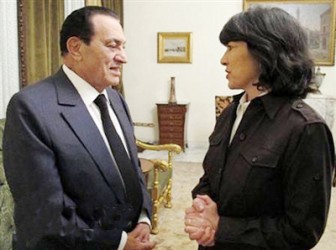WASHINGTON, (Reuters) – U.S. officials said yesterday they are discussing with Egyptians a variety of ways of moving toward an orderly transition of power in Egypt, which may lead to a speedier departure of President Hosni Mubarak.

The New York Times reported the Obama administration is talking with Egyptian officials a proposal for Mubarak to resign immediately.
The White House would not confirm the Times report but said discussions have been under way with Egyptians in an attempt to resolve the 10-day crisis in Egypt.
Violence has raged between pro- and anti-Mubarak demonstrators after Mubarak declared he would resist demands to leave now and would remain in power until September.
Tommy Vietor, spokesman for the White House National Security Council, said President Barack Obama has said now is the time to begin “a peaceful, orderly and meaningful transition, with credible, inclusive negotiations.”
“We have discussed with the Egyptians a variety of different ways to move that process forward, but all of those decisions must be made by the Egyptian people,” Vietor said.
More than one option was under discussion, a senior administration official said.
Obama and his top aides have carefully avoided calling for Mubarak’s resignation, instead insisting that an orderly transition “must begin now” and raising doubts about Mubarak’s plans to stay in power until September.
The Times reported that under a proposal discussed with high-level Egyptian officials, Mubarak would turn power over to a transitional government headed by Vice President Omar Suleiman with the support of the Egyptian military.
Vice President Joe Biden spoke to Suleiman on Thursday and urged that “credible, inclusive negotiations begin immediately in order for Egypt to transition to a democratic government.”
Biden urged the Egyptian government to ensure no violence breaks out and appealed for the release of detained journalists and human rights advocates as the possibility of a new round of rioting loomed today.
U.S. lawmakers applied pressure on the long-time U.S. ally, calling on Mubarak to transfer power to an inclusive caretaker government in a Senate resolution that went slightly beyond Obama’s public position.
Two influential senators, Republican John McCain and Democrat John Kerry, pushed the proposal, which expanded on Obama’s demand for a transition in Egypt to begin now. It was approved by the Senate on a voice vote.
The document calls for Mubarak to immediately begin an “orderly and peaceful transition to a democratic political system.”
This should include “the transfer of power to an inclusive interim government in coordination with leaders from Egypt’s opposition, civil society and military” to enact reforms needed to hold free and fair elections this year.
Kerry said on the Senate floor that the Egyptian government should move to an interim government “over these next days.”
McCain expressed fears of a bloodbath and emphasized that Egypt’s military was the most respected institution there but it risked turning people against it unless it acted “as a genuine peacemaker.”
Amid concerns that a wave of protests that erupted in Tunisia and then Egypt could spread to other Middle Eastern capitals, Obama phoned Yemeni President Ali Abdullah Saleh to follow up his pledges of reform with concrete actions.
The White House said Obama also told Saleh it is imperative that Yemen take forceful action against al Qaeda in the Arabian Peninsula.
Clinton spoke to Jordan’s King Abdullah — another close U.S. ally — yesterday to discuss Egypt and to express support for his own recent reforms, part of a wave of change by authoritarian governments across the Middle East seeking to head off Egypt-style unrest.




